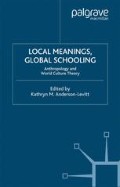Abstract
This chapter examines the culturally contingent roles of parents in the organization and operation of public schools (called “government schools”) in Tanzania. Specifically, it explores a recently introduced English-language primary school program, proposed and initiated by U.S. Protestant missionaries working in Tanzania, and several Tanzanian parents’ reactions to this program.
Access this chapter
Tax calculation will be finalised at checkout
Purchases are for personal use only
Preview
Unable to display preview. Download preview PDF.
References
Ball, S., R. Bowe, and S. Gewirtz. 1995. Circuits of schooling: A sociological exploration of parental choice of school in social class contexts. The Sociological Review 43: 52–78.
Berman, E. H. 1999. The political economy of educational reform in Australia, England and Wales, and the United States. In Comparative education: The dialectic of the global and the local, edited by R. E Arnove and C. A. Torres. Lanham, MD: Rowman and Littlefield.
Block, F. L. 1990. Postindustrial possibilities: A critique of economic discourse. Berkeley and Los Angeles: University of California Press.
Boli, J., and E O. Ramirez. 1992. Compulsory schooling in the Western cultural context. In Emergent issues in education: Comparative perspectives, edited by R. E. Arnove, P. G. Altbach, and G. P. Kelly. Albany: State University of New York.
Bray, M. 1999. Control of education: Issues and tensions in centralization and decentralization. In Comparative education: The dialectic of the global and the local, edited by R. E Arnove and C. A. Torres. Lanham, MD: Rowman and Littlefield.
Center for Education Reform. 2000. About School Choice. http://edreform.com/school_choice/
Ciekawy, D. 1998. Witchcraft in statecraft: Five technologies of power in colonial and postcolonial coastal Kenya. African Studies Review 41 (3): 119–41.
David, M. E. 1993. Parents, gender, and education reform. Cambridge, MA: Polity Press.
David, M. E., R. Edwards, D. Reay, and K. Standing. 1997. Choice within constraints: Mothers and schooling. Gender and Education 9 (4): 397–410.
Dirks, N. B., G. Eley, and S. B. Ortner. 1994. Introduction to Culture/power/history: A reader in contemporary social theory, edited by H. Dirks, G. Eley, and S. Ortner.
Fitzsimons, P. 1994. Human capital theory and the government’s industry training strategy. Journal of education policy 9 (3): 245–266.
Fitzsimons, P. 1999. Human capital theory and education. Encyclopedia of Philosophy of Education Online. http://www.educacao.pro.br/humancapital.htm
Good, T. L., and J. S. Braden. 2000. The great school debate: Choice, vouchers, and charters. Mahwah, NJ: Lawrence Erlbaum Associates.
Inkeles, A. 1998. One world emerging? Convergence and divergence in industrial societies. Boulder, CO: Westview Press.
Kazamias, A. M. and K. Schwartz. 1977. Intellectual and ideological perspectives in comparative education: An interpretation. Comparative Education Review 21 (2 and 3): 153–176.
Kinoshita, U. 2002. Anthropology of policy: Strengths and weaknesses. Manuscript, Department of Educational Policy Studies, University of Wisconsin—Madison.
Marginson, S. 1993. Education and public policy in Australia. Cambridge: Cambridge University Press.
Masemann, V. L. 1999. Culture and education. In Comparative education: The dialectic of the global and the local, edited by R. F. Arnove and C. A. Torres. Lanham, MD: Rowman and Littlefield.
Meyer, J. W 1992. World expansion of mass education, 1870–1980. Sociology of Education 37 (4): 454–75.
Ministry of Education and Culture. 1999. Basic Education Statistics for Tanzania. Dar es Salaam, Tanzania.
OECD. Organisation for Economic Co-Operation and Development. 1997. Internationalisation of higher education. Paris: Centre for Educational Research and Innovation.
Ramirez, E O., and M. J. Ventresca. 1992. Building the institution of mass schooling: Isomorphism in the modern world. In The political construction of education: The state, school expansion, and economic change, edited by B. Fuller and R. Rubinson. New York: Praeger.
Rubagumya, C. M. 1999. Choosing the language of instruction in post-colonial Africa: Lessons from Tanzania. Papers in Education and Development 20: 125–145.
Stambach, A. 1998. Education, mobility, and money: Reflections on the cultural meaning of educational investment. In Advances in educational policy, volume 4, edited by K. Wong. Greenwich, CT: JAI Press.
Stambach, A. 2000. Lessons from Mount Kilimanjaro: Schooling, community, and gender in East Africa. New York: Routledge.
Stambach, A. 2001 a. Consumerism and gender in an era of school choice: A look at US charter schools. Gender and Education 13 (2): 199–216.
Stambach, A. 2001b. Education and Christian fundamentalism. Paper presented at the University of Chicago Conference, Rethinking the interrelationship of anthropology and education. May 2001.
Strathern, A. 1995. Universals and particulars: Some current contests in anthropology. Ethos 23 (2): 173–186.
Tripp, A. M. 1997. Changing the rules: The politics of liberalization and the urban informal economy in Tanzania. Berkeley and Los Angeles: University of California Press.
Editor information
Copyright information
© 2003 Kathryn M. Anderson-Levitt
About this chapter
Cite this chapter
Stambach, A. (2003). World-Cultural and Anthropological Interpretations of “Choice Programming” in Tanzania. In: Anderson-Levitt, K.M. (eds) Local Meanings, Global Schooling. Palgrave Macmillan, New York. https://doi.org/10.1057/9781403980359_7
Download citation
DOI: https://doi.org/10.1057/9781403980359_7
Publisher Name: Palgrave Macmillan, New York
Print ISBN: 978-1-4039-6163-1
Online ISBN: 978-1-4039-8035-9
eBook Packages: Palgrave Social & Cultural Studies CollectionSocial Sciences (R0)

